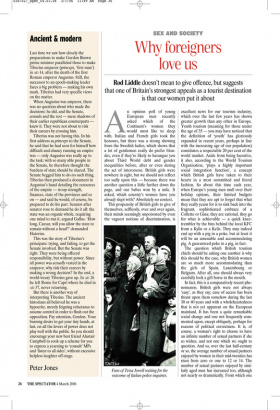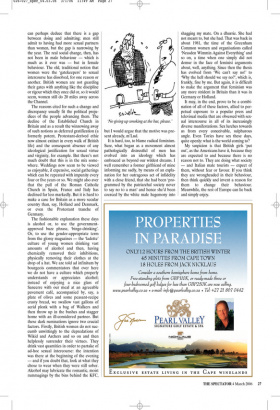Why foreigners love us
Rod Liddle doesn’t mean to give offence, but suggests that one of Britain’s strongest appeals as a tourist destination is that our women put it about An opinion poll of young European men recently asked which of the Continent’s women they would most like to sleep with. Italian and French girls took the honours, but there was a strong showing from the Swedish ladies, which shows that a lot of gentlemen really do prefer blondes, even if they’re likely to harangue you about Third World debt and gender inequalities before, after or even during the act of intercourse. British girls were nowhere in sight, but we should not reflect too sadly upon this — because there was another question a little further down the page, and our babes won by a mile. It asked, which country’s women have you already slept with? Absolutely no contest.
This propensity of British girls to give of themselves, selflessly, over and over again, their minds seemingly unpoisoned by even the vaguest notions of discrimination, is excellent news for our tourism industry, which over the last few years has shown greater growth than any other in Europe. Youth tourism (meaning for those under the age of 35 — you may have noticed that the definition of ‘youth’ has gloriously expanded in recent years, perhaps in line with the increasing age of our population) constitutes a respectable 20 per cent of the world market. Aside from being lucrative, it also, according to the World Tourism Organisation, ‘plays a highly important social integration function’, a concept which British girls have taken to their hearts in a most committed and literal fashion. So about this time each year, when Europe’s young men mull over their holiday options, their limited budgets mean that they are apt to forget that what they really yearn for is to sink back into the fragrant, sophisticated embrace of a Collette or Gina; they are rational, they go for what is achievable — a quick kneetrembler by the bins behind the local KFC from a Kylie or a Kelis. They may indeed end up with a pig in a poke, but at least it will be an amenable and accommodating pig. A guaranteed poke in a pig, in fact.
The question which British tourism chiefs should be asking one another is why this should be the case, why British women are so much more accommodating than the girls of Spain, Luxembourg or Belgium. After all, one should always very carefully look a gift horse in the mouth.
In fact, this is a comparatively recent phenomenon. British girls were not always ‘easy’, as they say; ease of access has been thrust upon them somehow during the last 30 or 40 years and with a wholeheartedness that is not yet apparent on the European mainland. It has been a quite remarkable social change and one not frequently commented upon, except obliquely, perhaps for reasons of political correctness. It is, of course, a woman’s right to choose to have an infinite number of sexual partners if she so wishes, and not one which we ought to question. And so, over the last half-century or so, the average number of sexual partners enjoyed by women in their mid-twenties has risen from zero or one to 12 or 14. The number of sexual partners enjoyed by similarly aged men has increased too, although not nearly so dramatically. From which one can perhaps deduce that there is a gap between doing and admitting; men still admit to having had more sexual partners than women, but the gap is narrowing by the year. The real social change, then, has not been in male behaviour — which is much as it ever was — but in female behaviour. The old, traditional notion that women were the ‘gatekeepers’ to sexual intercourse has dissolved, for one reason or another. British women are not guarding their gates with anything like the discipline or rigour which they once did or, so it would seem, women still do 20 miles away across the Channel.
The reasons cited for such a change and discrepancy usually fit the political prejudices of the people advancing them. The decline of the Established Church in Britain and as a result the winnowing away of such notions as deferred gratification (a formerly potent, Protestant-derived ethic now almost extinct in every walk of British life) and the consequent absence of any ideological justification for sexual virtue and virginity, for example. But there’s not much doubt that this is in the mix somewhere. Weddings now seem to be viewed as enjoyable, if expensive, social gatherings which can be repeated with impunity every four or five years or so. We might also aver that the pull of the Roman Catholic Church in Spain, France and Italy has declined far less markedly. But it is hard to make a case for Britain as a more secular country than, say, Holland and Denmark, or even the Protestant tranche of Germany.
The fashionable explanation these days is alcohol or, to use the governmentapproved buzz phrase, ‘binge-drinking’. Or, to use the gender-appropriate term from the glossy magazines — the ‘ladette’ culture of young women drinking vast amounts of alcohol and then, having chemically removed their inhibitions, physically removing their clothes at the drop of a hat. We are told ad infinitum by bourgeois commentators that over here we do not have a culture which properly understands or appreciates alcohol; instead of enjoying a nice glass of Sancerre with our meal at an agreeable pavement café, accompanied by, say, a plate of olives and some peasant-recipe crusty bread, we swallow vast gallons of acrid plonk with a bag of Walkers and then throw up in the bushes and stagger home with an ill-considered partner. But these dark ruminations ignore two crucial factors. Firstly, British women do not succumb unwittingly to the depredations of Wikid and Archers and so on and then helplessly surrender their virtues. They drink vast quantities in order to partake of ad-hoc sexual intercourse: the intention was there at the beginning of the evening — and if you doubt that, look at what they chose to wear when they were still sober. Alcohol may lubricate the romantic, moist rummagings by the bins behind the KFC, but I would argue that the motive was present already, m’Lud.
It is hard, too, to blame radical feminism. Sure, what began as a movement almost pathologically distrustful of men has evolved into an ideology which has embraced us beyond our wildest dreams. I well remember a former girlfriend of mine informing me sadly, by means of an explanation for her outrageous act of infidelity with a close friend, that she had been ‘programmed by the patriarchal society never to say no to a man’ and hence she’d been coerced by the white male hegemony into shagging my mate. On a dhurrie. She had not meant to, but she had. That was back in about 1981, the time of the Greenham Common women and organisations called ‘Neasden Wimmin Against Everything’ and so on, a time when one simply did not demur in the face of feminist arguments about, well, anything. Since then the thesis has evolved from ‘We can’t say no!’ to ‘Why the hell should we say no?’, which is, frankly, fine by me. But again, it is difficult to make the argument that feminism was any more strident in Britain than it was in Germany or Holland.
It may, in the end, prove to be a combination of all of these factors, allied to perpetual exposure to a popular press and televisual media that are obsessed with sexual intercourse in all of its increasingly diverse manifestations. Sex lurches towards us from every conceivable, sulphurous angle. Even Tories have sex these days, quite openly: what is the world coming to?
My suspicion is that British girls ‘put out’, as the Americans have it, because they are expected to and because there is no reason not to. They are doing what society — and Italian male tourists — expect of them, without fear or favour. If you think they are wrongheaded in their behaviour, then think quickly and invent a reason for them to change their behaviour. Meanwhile, the rest of Europe can lie back and simply enjoy.











































































 Previous page
Previous page